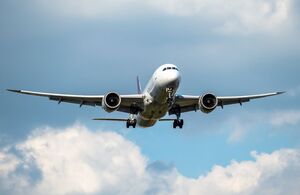Tough government action on student visas comes into effect
From 1 January 2024, tough government action means most international students can now no longer bring family members to the UK.

Image: Getty Images
Restrictions to student visa routes came into effect yesterday, as the government continues to slash migration and curb abuse of the immigration system.
International students starting courses this month will no longer be able to bring family members on all but postgraduate research courses and courses with government-funded scholarships. The changes, first announced last May, have also seen people banned from using the student visa as a backdoor route to work in the UK and will see an estimated 140,000 fewer people come to the UK.
The Office for National Statistics (ONS) estimated that net migration was 672,000 from June 2022 to June 2023. In the year ending September 2023, 152,980 visas were issued to dependants of students, a more than 930% rise from the 14,839 in the year ending September 2019.
The changes to student dependant rules are part of a wider package of measures to come into force that will drastically bring down the high numbers of migrants coming to the UK to sustainable levels, and crack down on those who take advantage of the flexibility of the UK’s immigration system.
Home Secretary James Cleverly said:
This government is delivering on its commitment to the British public to cut migration. We have set out a tough plan to rapidly bring numbers down, control our borders and prevent people from manipulating our immigration system, which will come into force throughout this year.
Yesterday, a major part of that plan came into effect, ending the unreasonable practice of overseas students bringing their family members to the UK. This will see migration falling rapidly by the tens of thousands and contribute to our overall strategy to prevent 300,000 people from coming to the UK.
Tom Pursglove MP, Minister for Legal Migration and the Border, said:
Our world-leading universities rightly attract some of the brightest students from around the world to the UK. But we have seen a surge in the number of dependants being brought by students, which is contributing to unsustainable levels of migration.
We are completely committed to seeing a decisive cut in migration. The action implemented yesterday to restrict bringing dependants on the student visa route allows us to better protect our public services, while supporting the economy by allowing the students who contribute the most to keep coming here.
This is part of a series of measures which together will see 300,000 fewer people coming to the UK compared to last year.
At the same time, the government is stopping the boats and tackling illegal migration. Small boat arrivals to the UK are down 35% this year, illegal working raids have increased by 70%, migration agreements have been signed with France, Bulgaria, Turkey, Italy, Georgia and Ethiopia, more than 5,000 Albanians have been returned and arrivals from Albania are down by 90%. This is on top of signing a new treaty with the government of Rwanda and introducing new legislation making it clear that Rwanda is a safe country and allowing asylum seekers to be relocated there as a safe third country.
The changes to student visas strike the right balance to continue to preserve the attractiveness of the UK’s world-leading higher education sector, while removing the ability for institutions to undermine the UK’s reputation by selling immigration not education.
The government remains committed to the International Education Strategy which recognises the important benefits that international students bring to the UK, including the economic contribution they make. This means balancing the commitment to lower overall levels of migration with ensuring those coming to the UK are highly skilled and provide the most benefit to our economy.
The government will work with universities to design an alternative approach, in order to continue to attract the brightest and the best to the UK, and so they can bring dependents to the UK’s world-leading universities, while continuing to reduce net migration.
In December, the Home Secretary announced a further set of measures to bring legal migration down to sustainable levels. This includes ending the abuse of health and care visas by stopping overseas care workers from bringing dependants, and requiring care firms in England to be regulated by the Care Quality Commission in order to sponsor visas.
Salary thresholds across the skilled worker route will also be increased by nearly 50% to £38,700, while the government is also cracking down on cut-price labour from overseas by scrapping the 20% salary discount for shortage occupations and replacing the Shortage Occupation List.
The minimum income requirement for British or settled people sponsoring family members to join them in the UK will also be increased to £38,700 by Spring 2025, while the Migration Advisory Committee will be commissioned to review the Graduate route to prevent abuse and ensure the integrity and quality of the UK higher education system is maintained.
This package of measures, taken in addition with the measures on student dependants, means that around 300,000 people who came to the UK last year would not be able to in the future – the largest reduction ever. This is a tough but fair approach to bring net migration down to sustainable levels as soon as possible, while ensuring those affected have ample time to prepare for upcoming changes – with the package being introduced gradually throughout early 2024.